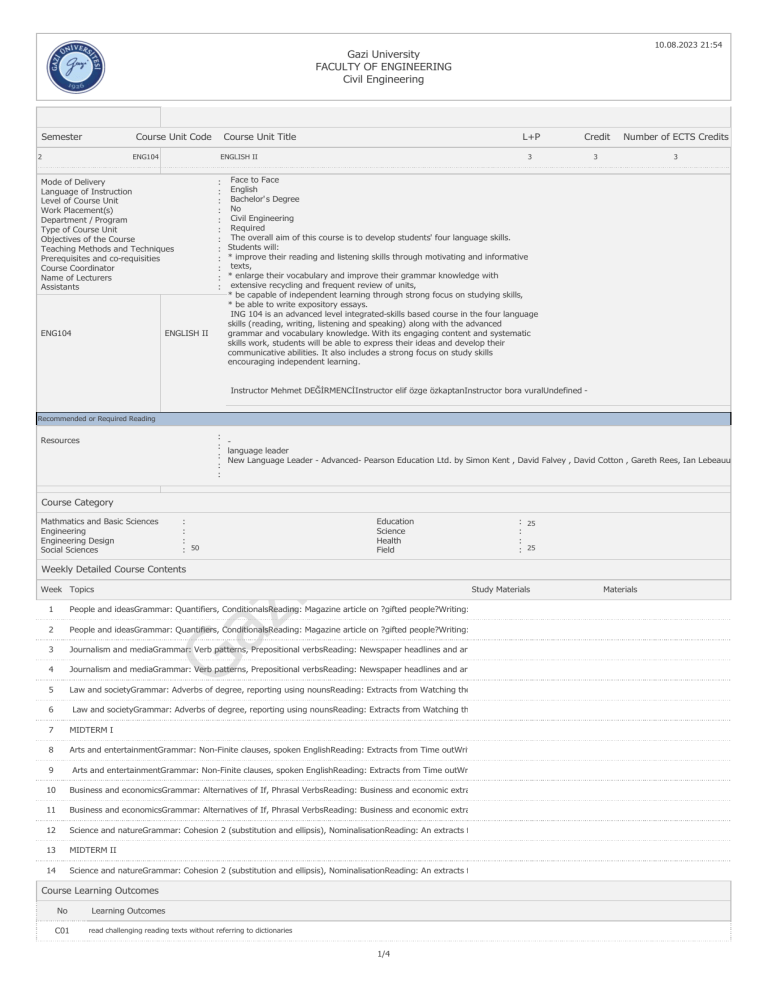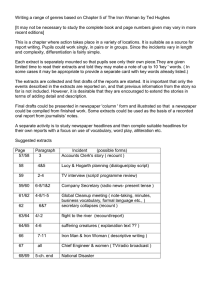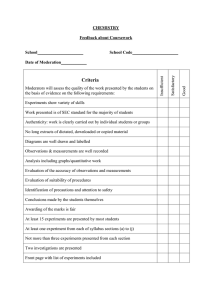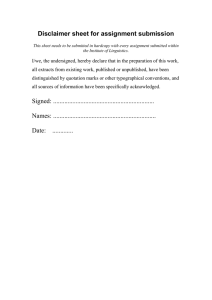
10.08.2023 21:54 Gazi University FACULTY OF ENGINEERING Civil Engineering Semester Course Unit Code 2 ENG104 L+P Credit Number of ECTS Credits 3 3 3 ENGLISH II Mode of Delivery Language of Instruction Level of Course Unit Work Placement(s) Department / Program Type of Course Unit Objectives of the Course Teaching Methods and Techniques Prerequisites and co-requisities Course Coordinator Name of Lecturers Assistants ENGLISH II : Face to Face : English : Bachelor' s Degree : No : Civil Engineering : Required : The overall aim of this course is to develop students' four language skills. : Students will: : * improve their reading and listening skills through motivating and informative : texts, : * enlarge their vocabulary and improve their grammar knowledge with : extensive recycling and frequent review of units, * be capable of independent learning through strong focus on studying skills, * be able to write expository essays. ING 104 is an advanced level integrated-skills based course in the four language skills (reading, writing, listening and speaking) along with the advanced grammar and vocabulary knowledge. With its engaging content and systematic skills work, students will be able to express their ideas and develop their communicative abilities. It also includes a strong focus on study skills encouraging independent learning. es i ENG104 Course Unit Title sit Instructor Mehmet DEĞİRMENCİInstructor elif özge özkaptanInstructor bora vuralUndefined Recommended or Required Reading : : language leader : New Language Leader - Advanced- Pearson Education Ltd. by Simon Kent , David Falvey , David Cotton , Gareth Rees, Ian Lebeauu : : iv er Resources Mathmatics and Basic Sciences Engineering Engineering Design Social Sciences : : : : 50 Weekly Detailed Course Contents Education Science Health Field Ün Course Category Study Materials Materials Ga zi Week Topics : 25 : : : 25 1 People and ideasGrammar: Quantifiers, ConditionalsReading: Magazine article on ?gifted people?Writing: Critical Thinking, an opinion-led essayListening: Lecture on CreativitySpeaking 2 People and ideasGrammar: Quantifiers, ConditionalsReading: Magazine article on ?gifted people?Writing: Critical Thinking, an opinion-led essayListening: Lecture on CreativitySpeaking 3 Journalism and mediaGrammar: Verb patterns, Prepositional verbsReading: Newspaper headlines and articles on journalismWriting: Research skillsListening: People in the media talkin 4 Journalism and mediaGrammar: Verb patterns, Prepositional verbsReading: Newspaper headlines and articles on journalismWriting: Research skillsListening: People in the media talkin 5 Law and societyGrammar: Adverbs of degree, reporting using nounsReading: Extracts from Watching the English by Kate FoxWriting: Synthesising informationListening: Extracts from 6 Law and societyGrammar: Adverbs of degree, reporting using nounsReading: Extracts from Watching the English by Kate FoxWriting: Synthesising informationListening: Extracts from 7 MIDTERM I 8 Arts and entertainmentGrammar: Non-Finite clauses, spoken EnglishReading: Extracts from Time outWriting: Creative writing (a screenplay)Listening: Interviews; performance reviews 9 Arts and entertainmentGrammar: Non-Finite clauses, spoken EnglishReading: Extracts from Time outWriting: Creative writing (a screenplay)Listening: Interviews; performance review 10 Business and economicsGrammar: Alternatives of If, Phrasal VerbsReading: Business and economic extracts from news websiteWriting: Making a business presentation, ParaphrasingLi 11 Business and economicsGrammar: Alternatives of If, Phrasal VerbsReading: Business and economic extracts from news websiteWriting: Making a business presentation, ParaphrasingLi 12 Science and natureGrammar: Cohesion 2 (substitution and ellipsis), NominalisationReading: An extracts from Solaris by Stanislaw LemWriting: Examination skillsListening: Description o 13 MIDTERM II 14 Science and natureGrammar: Cohesion 2 (substitution and ellipsis), NominalisationReading: An extracts from Solaris by Stanislaw LemWriting: Examination skillsListening: Description o Course Learning Outcomes No C01 Learning Outcomes read challenging reading texts without referring to dictionaries 1/4 C02 write expository essays C03 understand and respond to spoken English Program Learning Outcomes Learning Outcome P07 Ability to work individually. P03 Ability to design a complex system, process, device or product under realistic constraints and conditions, in such a way as to meet the desired result; ability to apply modern desi P15 Awareness in entrepreneurship, innovation; knowledge about sustainable development. P10 Prepare design and production reports, make effective presentations, and give and receive clear and intelligible instructions. P09 Knowledge of English of B1 level according to Common European Framework of Reference. P08 Ability to communicate effectively in Turkish, both orally and in writing; ability to write effective reports and comprehend written reports. P06 Ability to work efficiently in intradisciplinary and multi-disciplinary teams. P16 Knowledge about the global and social effects of engineering practices on health, environment, and safety, and contemporary issues of the century reflected into the field of engi P05 Ability to design and conduct experiments, gather data, analyze and interpret results for investigating complex civil engineering problems or discipline specific research questions. P02 Ability to identify, formulate, and solve complex civil engineering problems; ability to select and apply proper analysis and modeling methods for this purpose. P01 Adequate knowledge in mathematics, science and engineering subjects pertaining to the relevant discipline; ability to use theoretical and applied knowledge in these areas in com P14 Knowledge about business life practices such as project management, risk management, and change management. P13 Knowledge on standards used in civil engineering practice. P12 Consciousness to behave according to ethical principles and professional and ethical responsibility. P11 Recognition of the need for lifelong learning; ability to access information, to follow developments in science and technology, and to continue to educate him/herself. P04 Ability to devise, select, and use modern techniques and tools needed for analyzing and solving complex problems encountered in civil engineering practice; ability to employ info P17 Awareness of the legal consequences of engineering solutions. Ga zi Ün iv er sit es i No 2/4 Assessment Methods and Criteria ECTS Allocated Based on Student Workload In-Term Studies Quantity Percentage Quantity Duration Total Work Load Mid-terms 1 %50 14 3 42 Assigment 0 %0 Weekly Tutorial Hours 0 0 0 Practice 0 %0 Reading Tasks 14 1 14 Projects 0 %0 Searching in Internet and Library 0 0 0 Practice 0 %0 Material Design and Implementation 0 0 0 Mid-Term 0 %0 Report Preparing 0 0 0 Final examination 1 %50 0 0 0 2 10 20 Total %100 Activities Weekly Theoretical Course Hours Preparing a Presentation Midterm Exam and Preperation for Midterm Exam Contribution of Learning Outcomes to Programme Outcomes Contribution: 1: Very Slight 2:Slight 3:Moderate 4:Significant 5:Very Significant P01 P02 P03 P04 P05 P06 P07 P08 P09 P10 P11 3 5 2 5 2 i 3 es 2 sit 1 er 3 iv 3 Ün 1 Ga zi All ECTS Allocated Based on Student Workload Activities Quantity Duration 1 10 Final Exam and Preperation for Final Exam Total Work Load 3 Contribution of Learning Outcomes to Programme Outcomes iv er sit es i Contribution: 1: Very Slight 2:Slight 3:Moderate 4:Significant 5:Very Significant Ün 10 86 ECTS Credit of the Course Ga zi Total Work Load
![Literature and Society [DOCX 15.54KB]](http://s2.studylib.net/store/data/015093858_1-779d97e110763e279b613237d6ea7b53-300x300.png)


